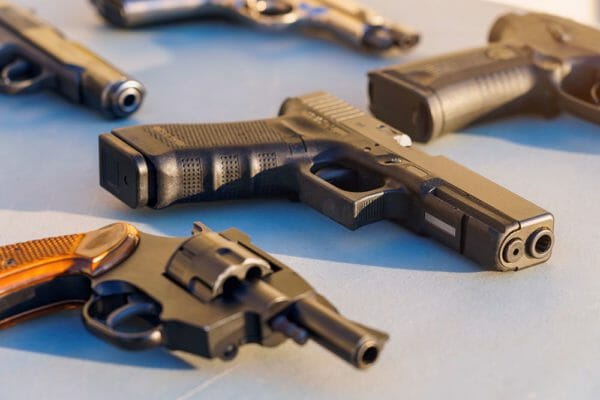
Mass Live is reporting how more than 70 firearms were brought in during a 90-minute “gun buyback” event conducted by the Hampden District Attorney at the Raymond Sullivan Public Safety complex in Springfield, Massachusetts, over the weekend.
The story made hay with the guns turned in: “several assault-style weapons, semi-automatic long guns with high-capacity magazines, and at least one ghost gun made with no serial number and consequently untraceable.”
Two months ago in Mukilteo, Washington, the local police department conducted its third “buyback” event, which brought in 61 firearms, according to KING News, in exchange for $5,750 worth of gift cards. Included in the haul were seven firearms dropped off by a woman whose husband had recently died.
But buried near the end of the KING report was this caveat: “Despite its popularity, several national studies show, ‘there is little empirical evidence of these programs’ effectiveness’ in decreasing gun violence.”
This apparently is the “dirty little secret” about gun buybacks—aside from the fact that sponsoring agencies or groups, such as police departments, never owned the guns to begin with, so it is impossible for anyone to be “buying” them back—the sponsors of such events never discuss: they really do not accomplish much.
As noted in the headline of a recent article in The Atlantic by David A. Graham: “There’s Just One Problem With Gun Buybacks—They Don’t Work.”
Even The Trace—the Michael Bloomberg-backed pro-gun-control news organ—admits, “The most rigorous studies of gun buyback programs have found little empirical evidence to suggest that they reduce shootings, homicides, or suicides by any significant degree in either the short- or long-term.”
The Trace acknowledged, “Proponents often point to anecdotal evidence, arguing that even one less gun on the street is a victory. But it’s challenging to empirically measure the broader effects of small, locally run initiatives. It doesn’t help that there’s a dearth of reliable data on gun violence and on the number of guns in circulation, especially at the local level.”
So, why do local governments conduct these things? Perhaps an article published back in October 2022 at Journalists Resource explained it.
“Early research on gun buybacks,” the article said, “mostly from the 1990s, largely finds these programs ineffective at curbing gun violence. Recent research frames gun buybacks in a somewhat mixed but more favorable light.
“On their own,” the report continues, “buybacks might not be effective if the goal is to use them to directly reduce violent crime. But research shows buybacks can help if they’re part of a broader effort to reduce gun violence. They can also influence public perception of how authorities are dealing with gun violence and serve as opportunities to educate communities about gun violence reduction strategies, according to researcher.”
Translation: It amounts to showmanship, the creation of an impression that “something” is being done about violent crime in the hope that local communities can be “educated” about so-called “gun violence reduction” efforts.
Still, there is not a lot of research to support or even justify such hopes.
Journalists Resource looked at a 2021 study published in the Annals of Surgery in which the authors concluded, “gun buybacks are, necessarily and by design, anonymous, making it very challenging to study individual outcomes of these programs. Evidence suggests that there may be a small, improved impact in suicide prevention in older, white males, but no effect on interpersonal gun violence or homicides.”
Another study, described as a working paper for the National Bureau of Economic Research, said this in its abstract: “Gun buyback programs (GBPs), which use public funds to purchase civilians’ privately-owned firearms, aim to reduce gun violence. However, next to nothing is known about their effects on firearm-related crime or deaths. Using data from the National Incident Based Reporting System, we find no evidence that GBPs reduce gun crime. Given our estimated null findings, with 95 percent confidence, we can rule out decreases in firearm-related crime of greater than 1.1 percent during the year following a buyback. Using data from the National Vital Statistics System, we also find no evidence that GBPs reduce suicides or homicides where a firearm was involved. These results call into question the efficacy of city gun buyback programs in their current form.”
This second study also acknowledged that gun owners might be reluctant to turn their guns in for less than they are worth, and they might also want to keep them for self-defense.
The authors of this second study wrote, “We conclude that GBPs are an ineffective policy strategy to reduce gun violence.”
Evidently, the only thing such buybacks accomplish is to perpetuate the public misconception that buybacks accomplish something. It’s a zero sum political game, proving only that some people, and some news agencies, are gullible enough to believe otherwise.
About Dave Workman
Dave Workman is a senior editor at TheGunMag.com and Liberty Park Press, author of multiple books on the Right to Keep & Bear Arms, and formerly an NRA-certified firearms instructor.







